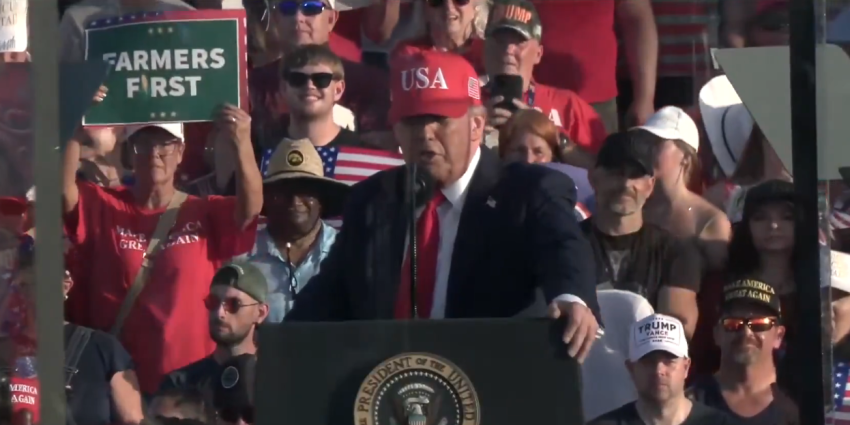Recent reports indicate that President Donald Trump is considering a mass amnesty program for millions of illegal aliens working in specific industries, such as agriculture, hospitality, and leisure. This policy, framed as a solution to labor shortages in these sectors, particularly for farmers, has sparked intense debate. Trump announced this plan in a speech following the passage of a major bill, acknowledging that it may upset his “radical right” base. However, this move stands in stark contrast to his campaign promises of strict immigration enforcement and mass deportations, raising questions about its implications for rural America and the integrity of U.S. hiring laws.
🇺🇸 Trump says he's working on legislation to allow illegal immigrants working in the agriculture and hotel/leisure sectors to stay in the country, and "serious radical right people" won't be happy about it.
Nope…
If they have been here for years, why haven't they obtained or… pic.twitter.com/CXrW8BuoPo— Drunk Cicero (@Drunk_Cicero) July 4, 2025
The Proposal and Its Hypocrisy
Trump’s campaign rhetoric in 2016 and 2020 heavily emphasized border security, a wall along the U.S.-Mexico border, and the deportation of illegal immigrants. He positioned himself as a champion of American workers, promising to prioritize their economic interests over those of illegal aliens. Yet, the proposed amnesty for millions working in agriculture, hotels, and restaurants directly undermines this stance. Critics argue this policy is a betrayal of the voters who supported him, expecting robust enforcement of immigration laws. The sentiment that “This is NOT what we voted for at all!” is being echoed across social media.
Radical right? That's Marxist rhetoric.
Reagan's gift to illegal aliens in the '80s paved the way for large corporations to take over home building, farming, and travel (leisure) with low-wage workforces. It was never about people. This is about money.https://t.co/iz4bitugwC
— Burt Carey (@BurtCarey) July 4, 2025
The hypocrisy lies in the contradiction between Trump’s past promises and his current proposal. By offering legal status to illegal aliens in select industries, the policy effectively rewards illegal border crossings and undermines the rule of law. It sends a message that entering the U.S. unlawfully can lead to amnesty if one secures employment in a favored sector. This approach not only erodes trust among Trump’s base but also risks incentivizing further illegal immigration, as potential migrants may see amnesty as a viable path to legal status.
Impact on Rural America
The argument for this amnesty often centers on supporting American farmers, who face labor shortages in agriculture. Proponents claim that illegal workers fill essential roles in harvesting crops, and legalizing them would stabilize the workforce and boost the economy—potentially by $64 billion, according to some estimates. However, this narrative overlooks the broader consequences for rural communities.
Rather than investing in American workers or improving wages and conditions to attract legal labor, the amnesty plan relies on a continuous supply of low-cost, often exploited, illegal workers. This approach risks transforming rural America into what critics describe as a “third world” landscape, where communities become dependent on a transient, low-wage workforce. Such reliance can strain local resources, including housing, schools, and healthcare, as small towns struggle to accommodate large populations of legalized workers. Moreover, it perpetuates a cycle of illegal immigration, as the promise of amnesty may encourage more border crossings, further stressing rural infrastructure.
Does This Really Support American Agriculture?
The claim that amnesty is necessary to support farmers ignores alternative solutions that prioritize American workers and legal immigration pathways. For example, improving wages and working conditions could attract U.S. citizens to agricultural jobs, reducing the need for illegal labor. Programs like the H-2A visa, which allows temporary agricultural workers to enter legally, could be expanded and streamlined to meet labor demands without rewarding illegal entry. We have also written numerous articles on how automation can replace the need for low-skilled workers. Instead, amnesty bypasses these options, prioritizing short-term fixes over sustainable solutions.
Furthermore, the policy risks undermining U.S. hiring laws. Employers who hire illegal aliens often violate regulations requiring verification of work eligibility, such as through E-Verify. By granting amnesty, the government implicitly condones these violations, weakening enforcement and creating a precedent for ignoring immigration laws. This not only disadvantages law-abiding businesses but also depresses wages for American workers, who must compete with a newly legalized workforce willing to accept lower pay.
The Bigger Picture
Trump’s amnesty proposal reflects a pragmatic but problematic shift in policy. While it may address immediate labor needs in industries like agriculture, it fails to consider the long-term consequences for rural America and the rule of law. Critics argue it incentivizes illegal immigration, undermines American workers, and transforms rural communities by prioritizing cheap labor over sustainable development.
The debate over this policy highlights a deeper tension within Trump’s administration: balancing economic demands with the principles of sovereignty and legal immigration that defined his platform. As one X user noted, “Trump is already working on amnesty for ag workers, hotel workers, and food workers… So basically every illegal who isn’t working in construction is about to get a pass.” This sentiment reflects growing frustration among supporters who feel misled by the pivot.
Conclusion
President Trump’s reported plan for mass amnesty in agriculture, hospitality, and leisure industries contradicts his long-standing immigration rhetoric and risks exacerbating the challenges facing rural America. While framed as a lifeline for farmers, it sidesteps solutions that prioritize American workers and legal pathways. By incentivizing illegal immigration and ignoring U.S. hiring laws, this policy threatens to transform rural communities into hubs of low-wage labor, undermining the very heartland Trump vowed to protect. As the debate unfolds, the question remains: is this short-term fix worth the long-term cost to America’s rural identity and legal framework?


